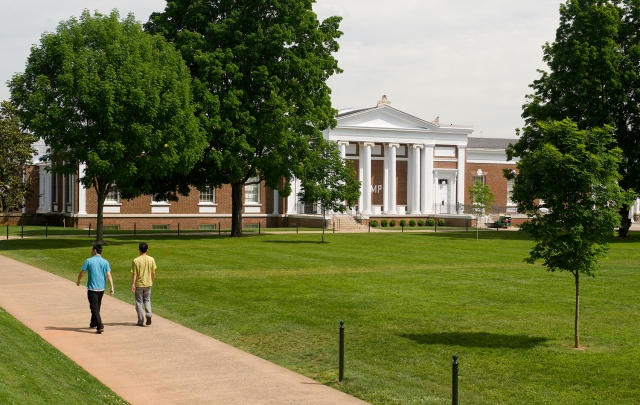University of Virginia (McIntire)
Kenan-Flagler wasn’t the only business school to make a huge leap in P&Q’s 2017 undergrad rankings. McIntire jumped from eighth to third last year, buoyed by across-the-board excellence in quantitative and qualitative measures alike.
However, any discussion of McIntire begins with its vaunted ICE (Integrated Core Experience) curriculum. For over two decades, ICE has acted as the “centerpiece” of the business program, which starts during students’ third year. This isn’t hardly your father’s business curriculum. A mix of the usual cases, lectures, and team projects, ICE is differentiated by its structure and focus. Instead of teaching subjects independently, ICE cohorts are team-taught in modular blocs, an integrative curriculum where functional fundamentals are learned in the context of a larger business operation. As a result, students can quickly grasp the complex relationships between various functions – and how decisions can ricochet across the operation.
Along with teaching old school fundamentals in a holistic context, McIntire also emphasizes soft skills, particularly communication. These skills are showcased during sponsor projects, where students work in small teams on projects for companies like Hilton and Major League Baseball. In fact, students say the value of these projects go far beyond applying theory to practice. “It was an intense, market research and war-game simulation which exposed us to all areas of the client and industry,” one graduate explains. “It was rewarding to be able to pitch your work to executives and have them ask you questions on the spot on your research and thoughts on how their firm should move forward. This really prepared me for my job as I directly interact with clients rather frequently.”
For others, completing ICE was truly a transformational endeavor. “The coupling of case-based courses with real-life strategic projects for Rolls Royce taught me more in one semester than I had learned in my previous two years,” adds another graduate. “Unlike my past courses, ICE placed an emphasis on truly original ideas and creative thinking. Regurgitating quotes from the reading or rephrasing the ideas of others were no longer accepted as productive participation. The high standard our professors held us to helped me to become confident in expressing and supporting my ideas and opinions, which has helped me a great deal in my career.”
Not surprisingly, McIntire is regarded as one of the top business schools for career preparation. 2016 grads earned $78,131 to start with a $231,263 return on investment over five years. Ninety-six percent of the class had landed jobs within three months, with an equal number agreeing that McIntire was responsible for helping them land the job they wanted. That wasn’t the only praise that graduates showered on the school, as it notched the highest scores from alumni on two questions: whether the degree was worth the time and tuition and whether the program prepared them for the realities of work.
Indeed, McIntire graduates were unquestionably the happiest alumni when surveyed by P&Q. The school also earned higher scores than every school for its quality of teaching, opportunities to nurture and improve their business skills, and network with practicing professionals and school alumni. Even more, it ranked among the top schools when graduates were surveyed on academic and career advising, faculty availability, and the quality of the experience. On top of that, the school ranked lowest among Top 10 business schools for debt. Just 33% of the 2017 class held any debt, with the average coming in at a moderate $20,000.
The biggest challenge now is consistent execution – something the program has emphasized since launching ICE. “Although constant innovation is essential, the McIntire School consistently emphasizes creating the best end-to-end student experience, and we believe that a great program is built on enduring values and strong fundamentals,” says Dean Carl Zeithaml.
Santa Clara University (Leavey)
In real estate, the mantra is “Location, location, location.” You won’t find a better location for a business school than Santa Clara, the seat of Silicon Valley.
Just don’t expect a tech-centric curriculum that focuses on coding and configuration. Instead, Leavey is a Jesuit-run institution that strongly infuses social justice into its curriculum. Yes, business students absorb a strong dose of the liberal arts that ties leadership to “conscientious capitalism,” which includes community service requirements and hands-on opportunities to develop skills through partnerships with NGOs and nonprofits.
Sound a little soft for Silicon sultans, right? In 2017, Accenture, Adobe, and Apple ranked among the top consumers of Leavey talent. For them, tech is trainable, but soft is second nature. At Leavey, students are curious, creative, confident, composed, and collaborative – communicators who start fast, play nice, and bring a purposeful passion to everything they do.
The curriculum is also designed for students to take the reins and learn by doing – a staple of tech and startup life. “In a class I got the chance to redesign our school’s class registration system so that students didn’t have to look up which classes they needed to graduate,” notes one 2015 graduate. “Instead the system would account for their history and show them only classes left which would fulfill their needs. The business school was very helpful in providing sample data and explaining the current system infrastructure during the discovery phase.”
Ranked 17th overall, Leavey appears poised to take off in the coming years. Ninety-three percent of the 2016 graduating class landed jobs in the summer, earning a respectable $66,770 on average. Despite a daunting 1,400 SAT average, 44% of applicants are ultimately accepted into Leavey. What’s more, 41% of business majors are minorities, adding a much-needed dash of diversity to the mix. While Leavey may demand something different from students, you’ll find few complaints. In P&Q’s 2015 alumni survey, 96% point out that Leavey helped them get the job they want – a tip of the hat to the school’s active career development center, which devotes heavy resources to alumni networking and job hunting training.













Questions about this article? Email us or leave a comment below.